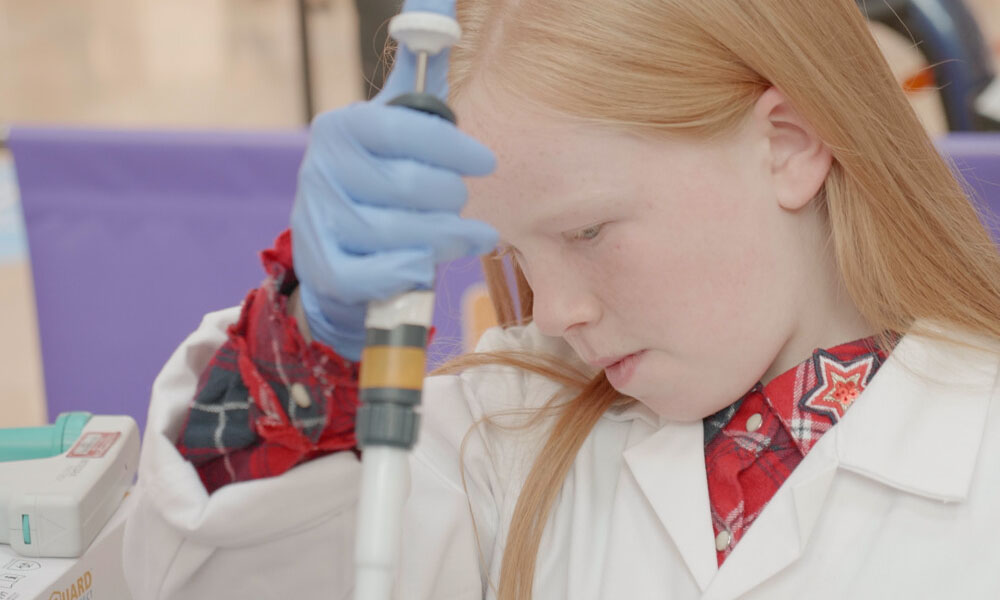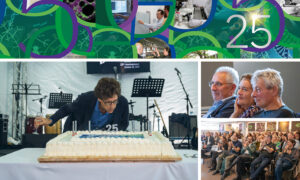
Tools for teachers
Five cool EMBL resources and events for secondary school science teachers and students

Ah, it’s that time of year, when the summer heat seems to resist departing, yet the evening breezes provide an increasing chill that says – autumn has arrived, and the start of a new school year too.
From fluorescence teaching-microscopes to a variety of workshops, EMBL is interested in making sure those in the earliest part of the scientist-making pipeline, or nurturing that pipeline, have resources to help spur them on.
“With research technologies advancing, what we know about human health, our environment and the molecular details of life is constantly growing,” said Eva Haas, EMBL Science Education Team Lead. “Those scientific developments go far beyond what’s written in dusty, old textbooks. We believe that exciting young learners about scientific research has an impact on us and our planet. Our science education activities provide direct access to current research and support and inspire teachers to foster fun, authentic science learning.”
To start this year’s science classes off with a burst of inspiration, here is a list of five cool resources – especially upcoming events – that EMBL has:
1. Learning more about cells.
A Virtual EMBL LearningLAB, ‘The cellular basis of life: current insights and tools for teaching’, will be held from 24 October to 6 November (application deadline 10 Oct). Available through EMBL’s eLearning platform “eCampus”, this professional development course is aimed at international secondary school teachers. To learn more or apply to attend, visit this link.
2. Italian teacher training.
The online EMBLconnect LearningLAB will offer a professional development course from 14 to 27 November for Italian-speaking secondary school teachers, run by EMBL partners at CusMiBio/University of Milan. This course is part of the EMBLconnect scheme, where partner institutions from education or research sectors use EMBL’s successful teacher-training model to run teacher trainings with EMBL support. EMBL provides original educational materials and talks from its world-class scientists. Registration is now open, and teachers can find more information at this link.
3. Computer modelling for students.
EMBL will host its annual scientific lecture – the EMBL Insight Lecture – on 2 December for international high school students (ages 15+). This year, James Sharpe, Head of EMBL’s Barcelona site and known for having invented a 3D imaging technique to study tissues and organs, will talk about using computer modelling to understand organ development. Schools are invited to join virtually via Zoom. Registration is now open at this link.
4. Science in School magazine.
Science in School aims to support teachers with STEM curricula connected to inspiring, cutting-edge science and technology news and feature stories that excite students and attract them to careers in these fields. Published and funded by EIROforum, a collaboration between eight of Europe’s largest inter-governmental scientific research organisations, the journal is a non-profit project that EMBL coordinates. Check out the latest issue here.
5. Teaching modules.

Looking for an interactive science lab book on ocean pollution? Maybe some microbial genome puzzles? EMBL’s Science Education and Public Engagement office offers TeachingBASE, a collection of EMBL-developed molecular biology teaching modules designed for both teachers and students. The materials are freely available through this link.
EMBL’s educational resources continue to grow. Only recently, what was formerly known as the European Learning Laboratory for the Life Sciences (ELLS) became a new office at EMBL that is now called Science Education and Public Engagement (SEPE). SEPE will lead EMBL’s science education activities and also coordinate its efforts in outreach and public engagement. So, stay tuned to new educational opportunities that arise through EMBL.


